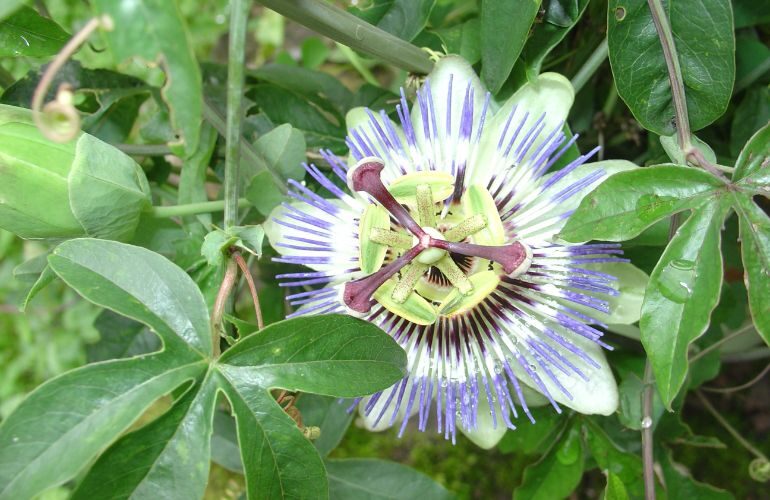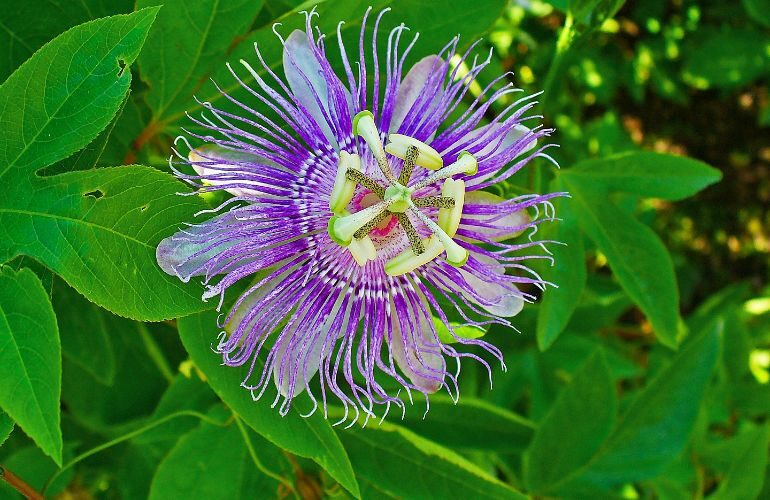Identification
Passionflower plants, also known as Passiflora, are characterized by their distinctive, intricate flowers and vining habit. Here are some features to look for when identifying a passionflower plant:
- Leaves: Passionflower leaves are alternate and palmate, meaning they have several lobes radiating from a central point. The leaves are typically glossy and dark green, with serrated edges.
- Flowers: Passionflowers have large, showy flowers with a complex structure. The flowers consist of five petals and sepals, with a fringe of filaments around the base. In the center, there is a structure called a corona, which may be a different color from the petals and sepals. Depending on the species, the flowers may be white, pink, purple, or blue.
- Fruit: After the flowers have been pollinated, they develop into a fruit that is roughly the size and shape of a chicken egg. The fruit is typically green or yellow when ripe, and contains numerous seeds surrounded by a pulpy aril.
- Vining habit: Passionflower plants are climbers, with thin, twining stems that can reach up to 30 feet long. The vines may attach themselves to structures or other plants using tendrils.
- Habitat: Passionflower plants are native to tropical and subtropical regions of the Americas, but they have been introduced to other parts of the world as ornamental plants. They grow in a variety of habitats, including forests, thickets, and disturbed areas.
Various parts of the Passionflower plant have been used for medicinal purposes, primarily for their calming and sedative properties. Here are some of the parts of the plant that are commonly used:
- Leaves: The leaves of the Passionflower plant are the most commonly used part for medicinal purposes. They are often dried and used to make teas, tinctures, and capsules. Passionflower leaves are used to treat anxiety, insomnia, nervousness, and general restlessness.
- Flowers: The flowers of the Passionflower plant can also be used for medicinal purposes. They are often dried and used to make teas, tinctures, and extracts. Passionflower flowers are used to treat anxiety, insomnia, nervousness, and general restlessness, as well as for pain relief.
- Stems: The stems of the Passionflower plant are less commonly used, but they can be used to make tinctures and extracts. They are also used to treat nerve pain and to reduce inflammation.
- Fruit: The fruit of the Passionflower plant is not commonly used for medicinal purposes, but it can be eaten and is sometimes used to make jams and jellies.
It’s important to note that while Passionflower is generally considered safe when used as directed, it can interact with certain medications and may not be suitable for everyone. It’s always best to consult with a healthcare professional before using any herbal remedies.
Common Name
Passionflower
Scientific Name
Passiflora incarnata
Name in popular languages
- Spanish: Flor de la Pasión or Pasiflora
- French: Fleur de la passion or Passiflore
- Portuguese: Flor da Paixão or Passiflora
- German: Passionsblume
- Italian: Fiore della passione or Passiflora
- Dutch: Passiebloem
- Swedish: Passionsblomma
- Danish: Passionsblomst
- Norwegian: Pasjonsblomst
- Finnish: Passionkukka
- Russian: Маракуйя or Пассифлора
- Chinese: 西番莲
- Japanese: パッションフラワー (passhonfurawā)
- Korean: 패션플라워 (paesyeonpeullawo)
Origin and History
Passionflower (Passiflora incarnata) is native to the southeastern United States, but it also grows in parts of Central and South America. The plant has a long history of use by various indigenous cultures for medicinal and spiritual purposes.
The native people of the southeastern United States used Passionflower for its sedative and calming effects. They also used it to treat pain, gastrointestinal problems, and wounds. The Cherokee people, in particular, used Passionflower to treat menstrual cramps, as well as to reduce inflammation and lower blood pressure.
The plant was introduced to Europe in the 16th century, where it became popular among herbalists and physicians as a treatment for anxiety and sleep disorders. In the 19th century, Passionflower was included in the United States Pharmacopeia as a treatment for nervousness, insomnia, and epilepsy.
Today, Passionflower is still used for its sedative and calming effects, and it is commonly used to treat anxiety, insomnia, and other conditions related to stress. Passionflower is also used as a natural remedy for pain relief, menstrual cramps, and to support healthy blood pressure levels. It is available in various forms, including teas, tinctures, capsules, and extracts. However, it is always important to consult with a healthcare professional before using any herbal remedies.
Nutritional constituents
Passionflower (Passiflora incarnata) is a plant that has been traditionally used for medicinal purposes, particularly for its calming and sedative effects. It contains several constituents that are believed to be responsible for its medicinal properties. Some of these constituents include:
- Flavonoids: Passionflower contains several flavonoids, including apigenin, luteolin, and quercetin. These compounds have antioxidant and anti-inflammatory properties and may help reduce anxiety and promote relaxation.
- Alkaloids: Passionflower contains several alkaloids, including harmine, harmaline, and harmalol. These compounds have been shown to have sedative effects and may help improve sleep quality.
- GABA: Passionflower is believed to increase the levels of gamma-aminobutyric acid (GABA) in the brain. GABA is a neurotransmitter that helps regulate brain activity and may help reduce anxiety and promote relaxation.
- Vitamins and minerals: Passionflower contains several vitamins and minerals, including vitamin C, vitamin A, iron, and potassium.
Medicinal or Health Benefits
Passionflower (Passiflora incarnata) has been used for centuries as a natural remedy for various health conditions. Here are some of the potential health benefits of passionflower:
- Anxiety and sleep disorders: Passionflower has been found to have anxiolytic and sedative effects, making it useful for treating anxiety, insomnia, and other sleep disorders.
- Pain relief: Passionflower may have analgesic effects, making it useful for relieving pain associated with conditions such as migraines, menstrual cramps, and back pain.
- Blood pressure and cardiovascular health: Passionflower has been found to have vasodilatory effects, meaning it can help to lower blood pressure and improve cardiovascular health.
- Menopause symptoms: Passionflower has been found to have estrogenic effects, making it useful for relieving menopause symptoms such as hot flashes and night sweats.
- Anti-inflammatory and antioxidant effects: Passionflower contains various bioactive compounds, such as flavonoids and alkaloids, that have anti-inflammatory and antioxidant effects, which may be beneficial for preventing or treating chronic diseases such as cancer and cardiovascular disease.
Scientific Perspective
Passionflower (Passiflora incarnata) has been studied extensively for its potential health benefits. Here are some examples of scientific research on the use of passionflower for health and medicinal purposes:
- Anxiety: Several studies have suggested that passionflower may help reduce anxiety. For example, a 2016 study found that a passionflower extract was effective in reducing symptoms of anxiety in adults with generalized anxiety disorder. Another study published in 2017 found that passionflower was as effective as oxazepam (a prescription anti-anxiety medication) in treating anxiety symptoms in adults.
- Insomnia: Passionflower has also been studied for its potential effects on sleep. A 2017 study found that a passionflower extract improved sleep quality in adults with insomnia. Another study published in 2019 found that passionflower was effective in improving sleep latency (the time it takes to fall asleep) in adults with sleep disturbances.
- Menopausal symptoms: Passionflower has been investigated for its potential effects on menopausal symptoms. A 2013 study found that passionflower extract reduced hot flashes and improved sleep quality in women going through menopause.
- Pain relief: Passionflower has been shown to have analgesic (pain-relieving) effects in animal studies. A 2016 study found that a passionflower extract reduced pain sensitivity in mice.
- Gastrointestinal health: Passionflower has been traditionally used for its potential digestive benefits. A 2018 study found that passionflower extract improved symptoms of irritable bowel syndrome (IBS) in adults.
- Blood pressure and cardiovascular health: A randomized, double-blind, placebo-controlled trial found that passionflower extract improved endothelial function and reduced blood pressure in patients with hypertension.
While these studies are promising, more research is needed to fully understand the potential health benefits of passionflower and to determine optimal dosages and formulations for different conditions. It’s important to talk to your healthcare provider before using passionflower or any other natural remedy for health purposes.
FDA's perspective
The FDA (U.S. Food and Drug Administration) has not approved passionflower for the treatment or prevention of any medical condition. However, passionflower is generally recognized as safe (GRAS) for use as a dietary supplement.
According to the FDA, dietary supplements like passionflower are not subject to pre-market review and approval, but the manufacturers are responsible for ensuring that their products are safe and accurately labeled. The FDA can take action against manufacturers if they make false or misleading claims about the safety or effectiveness of their products.





